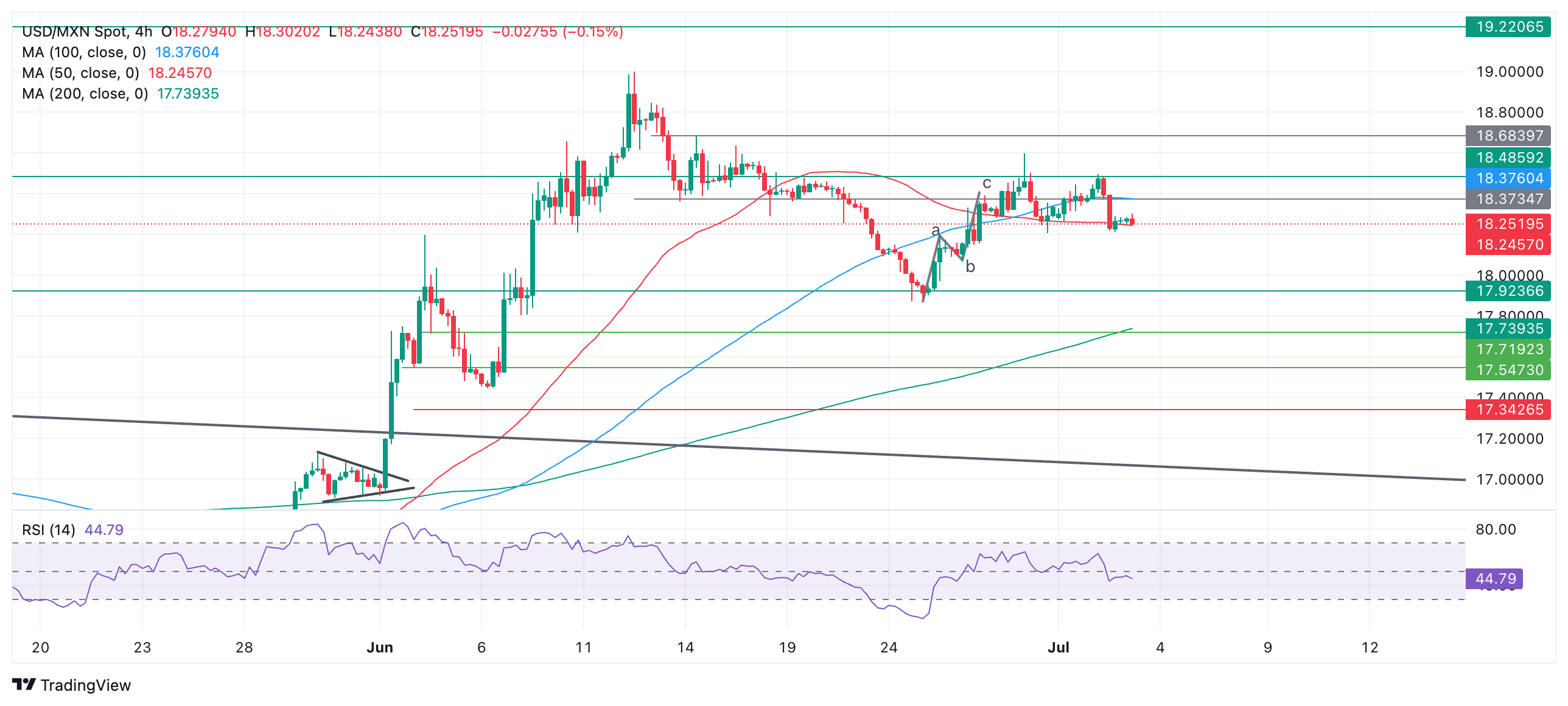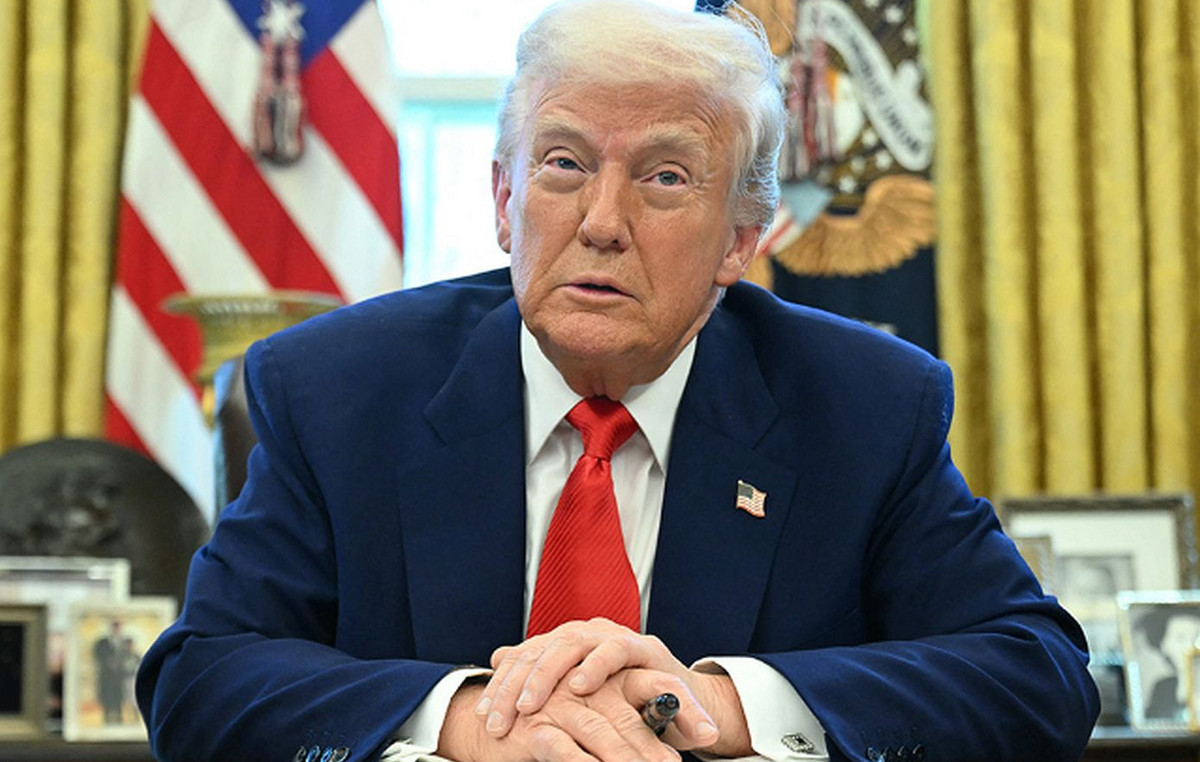- The Mexican Peso trades variably as idiosyncratic factors affect its major counterparts.
- USD/MXN is impacted by a perceived shift in the Federal Reserve’s stance following a speech by its chairman on Tuesday.
- In Europe, political factors related to the upcoming elections impact EUR/MXN and GBP/MXN.
The Mexican Peso (MXN) is trading based on distinctive domestic factors affecting its major counterparts on Wednesday.
The US Dollar (USD) is weakening against the Mexican Peso following a speech by Federal Reserve (Fed) Chairman Jerome Powell that reflected a shift in stance from the more cautious rhetoric that preceded it. Across the Atlantic, political risk in Europe ahead of key elections in France and the UK is causing volatility for the Euro and limiting gains for the British Pound.
At the time of writing, one US Dollar (USD) buys 18.25 Mexican Pesos, EUR/MXN is trading at 19.63, and GBP/MXN is trading at 23.17.
Mexican Peso Rises Against US Dollar Following Powell’s Speech
The Mexican Peso is rising against the USD after a speech by Fed Chairman Jerome Powell on Tuesday, which surprised investors following cautious comments from his colleagues. Powell highlighted progress on inflation, suggesting the Fed was now closer to cutting interest rates. Lower rates are negative for a currency as they reduce foreign capital flows.
The US dollar’s fall is limited, however, by an increase in the odds that former US President Donald Trump could win the US presidential election in November. An obstacle in his path to the White House was removed on Monday when the US Supreme Court ruled that he had partial immunity from charges of inciting the uprising that followed his election defeat in 2020. Meanwhile, his rival, President Joe Biden, faces questions about his mental capacity following several gaffes made during a televised debate last Thursday.
Europe on the move
The Euro is recovering against the Mexican Peso as risks of France’s far-right party, National Rally (RN), winning an outright majority in the second round of French elections on July 7 diminish. Although RN won the majority of the vote during the first round, the remaining centrists and socialists have formed a coalition to try to prevent RN from winning an outright majority in the second round.
This coalition has left many moderate voters with difficult choices, according to Reuters, and there is a risk that they could boycott the election in many constituencies where neither extreme appeals to them. However, the coalition will make it harder for RN to win an outright majority, easing pressure on the Euro, which had weakened due to concerns that an RN government would destabilise the EU.
Pound limited by UK tax problems
The British Pound (GBP) is capped against the Mexican Peso on growing concerns about UK finances ahead of the July 4 general election, according to Reuters.
With little fiscal room to boost growth through tax or spending policies, the new government could turn to the BoE to provide the necessary stimulus. This could mean the central bank lowers interest rates sooner than imagined, resulting in a weaker Pound. The BoE’s supposed “independence,” however, is a counterargument to this view; another is still-high wage inflation in the UK, which will prevent the BoE from cutting interest rates in the near term, according to Philip Bokeloh, Senior Economist at Abn Amro.
Technical Analysis: USD/MXN is trading in a short-term range
The USD/MXN is meandering in a range after pulling back from its June 28 high of 18.59. It is currently at the lower end of the range, trading at 18.20. The pair may be entering a sideways trend although it is still a bit early to be sure.
USD/MXN 4-hour chart
If USD/MXN rises and breaks above 18.59, it will make a higher high and likely continue to 18.68 (June 14 high), followed by 19.00 (June 12 high). A break above 19.00 would provide strong confirmation of a resumption of the short- and medium-term uptrends.
A move below 18.06 (June 26 low), however, would suggest that the short-term downtrend was resuming and would likely see a continuation towards 17.87 (June 24 low).
The direction of the long-term trend remains uncertain.
Mexican Peso FAQs
The Mexican Peso is the legal currency of Mexico. The MXN is the most traded currency in Latin America and the third most traded currency in the Americas. The Mexican Peso is the first currency in the world to use the $ sign, prior to the later use of the Dollar. The Mexican Peso or MXN is divided into 100 cents.
Banxico is the Bank of Mexico, the country’s central bank. Created in 1925, it provides the national currency, the MXN, and its primary objective is to preserve its value over time. In addition, the Bank of Mexico manages the country’s international reserves, acts as a lender of last resort to the banking sector, and provides economic and financial advice to the government. Banxico uses the tools and techniques of monetary policy to achieve its objective.
When inflation is high, the value of the Mexican Peso (MXN) tends to decrease. This implies an increase in the cost of living for Mexicans, which affects their ability to invest and save. In general, inflation affects the Mexican economy because Mexico imports a significant amount of final consumer products, such as gas, fuel, food, clothing, etc., and a large amount of production inputs. On the other hand, the higher the inflation and debt, the less attractive the country is for investors.
The exchange rate between the USD and the MXN affects imports and exports between the United States and Mexico, potentially affecting demand and trade flows. The price of the Dollar against the Mexican Peso is affected by factors such as monetary policy, interest rates, the consumer price index, economic growth and some geopolitical decisions.
The exchange rate between the USD and the MXN affects imports and exports between the United States and Mexico, potentially affecting demand and trade flows. The price of the Dollar against the Mexican Peso is affected by factors such as monetary policy, interest rates, the consumer price index, economic growth and some geopolitical decisions.
Source: Fx Street
I am Joshua Winder, a senior-level journalist and editor at World Stock Market. I specialize in covering news related to the stock market and economic trends. With more than 8 years of experience in this field, I have become an expert in financial reporting.








